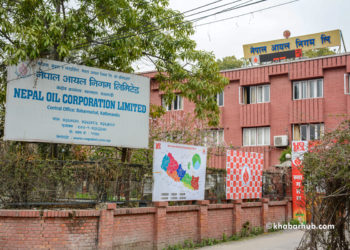The unprecedented COVID-19 crisis has come with a dire economic outlook. The persistent increase of COVID-19 cases worldwide has fabricated widespread concerns in Nepal as well.
The global economic slowdown and travel restrictions will affect migratory movements, and this is likely to decrease the remittances flow.
According to the World Bank, global remittances are projected to decline sharply, by about 20 percent in 2020 due to the economic crisis induced by the current pandemic and shutdown of all socio-economic activities.
For a poor country like Nepal, remittances are the most important buffer for unexpected life expenses and investments in shaping a better future.
For remittances, the safety net is now frayed by job losses due to the lockdown and shutdowns of the factories and service sectors. COVID-19 is crippling the world economy and impacting the workers worldwide.
Although India is the most popular destination of the international migrants from Nepal, its share has been decreasing with the rise of labor migration to other destination countries, namely the GCC countries and Malaysia in the last two decades.
In this scenario, Nepal is no exception and is at the risk of losing its lifeline, which is international labor migration remittances. Foreign Employment and Remittances Foreign employment is the most significant motivation for international migration from Nepal.
The formal and temporary migration began after people started to work in the British army following the Sugauli Treaty that was signed on 2 December 1815.
However, recently, the scope for out-migration following military services has declined and more and more people have migrated for other types of jobs.
Although India is the most popular destination of the international migrants from Nepal, its share has been decreasing with the rise of labor migration to other destination countries, namely the GCC countries and Malaysia in the last two decades.
A decade long domestic conflict (1995-2006) and lengthening political transition forced most of the youth to enter into the labor market to go abroad for employment and send money back home to support their families.
Apart from India, the most popular destinations for Nepalese migrant workers are Malaysia, Saudi Arabia, and Qatar, in addition to other countries including the United Kingdom, the United States, the UAE, Australia, Brunei Darussalam, Japan, and South Korea.
In the current situation, COVID-19’s effect on remittances in Nepal is disastrous as this major contributing area is at serious risk. In the coming days, its effect seems to be twofold.
At present, Nepal has furthered its bilateral ties with 110 countries for foreign employment and has signed bilateral labor agreements with eight countries (Qatar, the UAE, Japan, South Korea, Bahrain, Israel, Jordan, and Malaysia).
Therefore, remittance has become an important source of foreign exchange earnings in Nepal. This is reflected in the fact that remittance inflows have outpaced foreign direct investment and Official Development Assistance (ODA) over the last few decades.
According to the Nepal Rastra Bank, the remittance income of Nepalese working abroad was 879.3 billion rupees in the fiscal year 2018/19. The household survey (2010/11) reported the percentage of households receiving remittances increased from 32 percent in 2003/04 to 56 percent in 2010/11.
The ratio of remittance inflows to GDP increased from 9.7 percent in 1999/00 to 29.6 percent in 2015/16 which is reduced to 25.4 percent in 2018/19.
According to a World Bank report, Nepal was the top recipient of remittances as a share of GDP in South Asia and the fifth-most remittance-dependent economy in the world after Tonga, Kyrgyz Republic, Tajikistan and Haiti in 2019.
Impact on Remittances and Foreign Employment According to the World Bank, the economic crisis induced by COVID-19 could be long and pervasive when viewed from the perspective of migration.
In the current situation, COVID-19’s effect on remittances in Nepal is disastrous as this major contributing area is at serious risk. In the coming days, its effect seems to be twofold.
On the one hand, the wages of the Nepalese workers may go down, on the other, there are chances of economic recession in those countries.
In the Gulf countries, where most of the Nepalese work, there is a sharp decline in demand and prices for petroleum products.
If they become unemployed, it will affect the country’s foreign exchange reserves causing severe impact on the Nepalese economy.
Falling remittances could have knock-on effects in multiple areas of the domestic economy, harming government revenue, and reducing liquidity in the banking industry.
Remittance receiving households will have a hard time managing their household economy, especially the lower-middle-class strata Nepal Government has stopped issuing new work permits for foreign employment since 13 March 2020 to contain the spread of COVID-19.
The government’s decision to stop issuing permits to migrant workers will also have significant consequences for the country, where economic activities are driven by remittances. A drop in migration could swell the ranks of unemployed youth at home.
(The writer works as Research Associate at NIICE on the economic policy of South Asia and China)
(Nepal Institute for International Cooperation and Engagement (NIICE), Nepal’s independent think tank, and Khabarhub — Nepal’s popular news portal — have joined hands to disseminate NIICE research articles from Nepal)









Comment